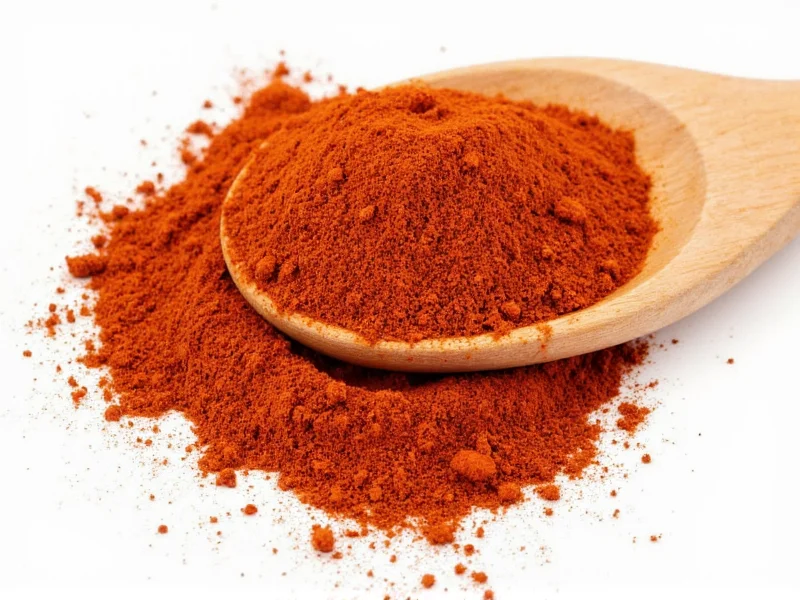When recipe planning hits a snag and you're staring at an empty spice jar, knowing how to substitute cayenne pepper for chili powder becomes essential kitchen knowledge. This common substitution question arises frequently in home cooking, especially when preparing Tex-Mex dishes, chili con carne, or southwestern-style recipes. Understanding the critical differences between these spices prevents culinary disasters and ensures your dishes maintain their intended flavor balance.
Understanding the Fundamental Differences
Before attempting cayenne pepper vs chili powder substitution, you must recognize these are fundamentally different products:
- Cayenne pepper is a single-ingredient spice made from ground dried cayenne peppers, delivering pure, intense heat (30,000-50,000 Scoville units)
- Chili powder is typically a blend containing ground chilies plus complementary spices like cumin, garlic powder, oregano, and paprika (typically 1,000-3,000 Scoville units)
This distinction explains why direct 1:1 substitution fails—cayenne pepper to chili powder ratio requires careful calculation to avoid creating inedibly spicy dishes. The heat differential means using equal amounts would make your recipe 4-8 times hotter than intended.
Proper Substitution Ratios and Techniques
Successful substitute cayenne for chili powder attempts require precise measurements. The following table provides reliable conversion guidelines:
| Chili Powder Required | Cayenne Pepper Substitute | Additional Spices to Add |
|---|---|---|
| 1 tablespoon | 1/4 - 1/2 teaspoon | 1/2 tsp cumin + 1/4 tsp paprika |
| 2 tablespoons | 1/2 - 1 teaspoon | 1 tsp cumin + 1/2 tsp paprika |
| 1/4 cup | 1 - 2 teaspoons | 2 tsp cumin + 1 tsp paprika |
Always add the cayenne gradually while tasting—how much cayenne equals chili powder varies based on your specific spice brands and personal heat tolerance. Remember that cayenne provides only heat, while chili powder contributes both heat and complex flavor notes.
When Substitution Works Best
Certain recipes tolerate cayenne pepper instead of chili powder better than others:
- Hearty meat dishes like chili con carne or beef stew where other strong flavors can balance the heat
- Long-cooked recipes where the intense cayenne flavor mellow slightly during cooking
- Dishes with dairy components like cheese or sour cream that counteract heat
- Recipes already containing complementary spices like cumin and garlic
For can I use cayenne instead of chili powder in chili scenarios, this substitution works reasonably well if you follow the proper ratios and supplement with additional spices to recreate chili powder's complexity.
When to Avoid This Substitution
Some recipes simply won't work with this substitution:
- Delicate dishes like fish tacos or chicken enchiladas where cayenne would overpower
- Sweet or balanced flavor profiles like mole sauce that rely on chili powder's nuanced blend
- Recipes specifically calling for mild chili powder where even adjusted cayenne creates excessive heat
- Dishes for children or heat-sensitive guests where precise heat control matters
In these cases, consider chili powder substitute without cayenne options like paprika-based blends or commercial chili powder alternatives.
Practical Substitution Tips
Follow these professional techniques for successful spice substitution:
- Always start with less—you can add more heat but can't remove it once incorporated
- Mix cayenne with other dry spices before adding to distribute heat evenly
- Add acid like lime juice at the end to balance excessive heat
- Include cooling elements such as dairy or avocado in the final presentation
- Make a test batch with a small portion before committing the entire recipe
Understanding spice substitution guide for cooking principles helps navigate these situations confidently. Remember that successful substitution isn't just about heat—it's about replicating the complete flavor profile that chili powder provides.
Alternative Substitutes Worth Considering
If you're looking for cayenne pepper substitute options that better match chili powder's complexity:
- Hot paprika blend: Mix 2 parts paprika with 1 part cumin and a pinch of cayenne
- Chipotle powder: Provides smoky depth with moderate heat (use 3/4 the amount)
- Pre-made taco seasoning: Contains similar spice profiles (use 2/3 the amount of chili powder)
These alternatives often create more balanced results than using cayenne alone when you need chili powder replacement in recipes.











 浙公网安备
33010002000092号
浙公网安备
33010002000092号 浙B2-20120091-4
浙B2-20120091-4